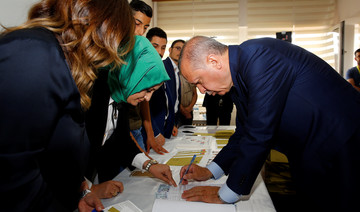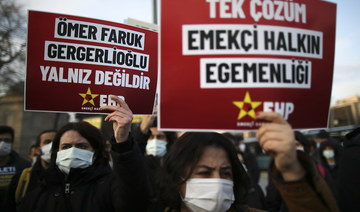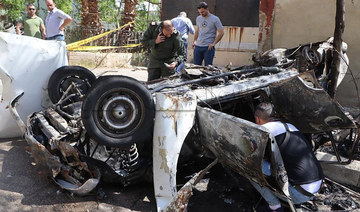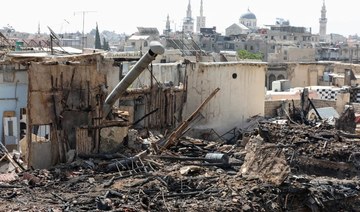ISTANBUL: President Recep Tayyip Erdogan won Turkey’s landmark election Sunday, the country’s electoral commission said, ushering in a new system granting the president sweeping new powers which critics say will cement what they call a one-man rule.
The presidential and parliamentary elections, held more than a year early, complete NATO-member Turkey’s transition from a parliamentary system of government to a presidential one in a process started with a referendum last year.
“The nation has entrusted to me the responsibility of the presidency and the executive duty,” Erdogan said in televised remarks from Istanbul after a near-complete count carried by the state-run Anadolu news agency gave him the majority needed to avoid a runoff.
Speaking early Monday, Supreme Election Council head Sadi Guven said 97.7 of votes had been counted and declared Erdogan the winner.
Guven said that based on unofficial results, five parties passed the threshold of 10 percent of votes required for parties to enter parliament.
Cheering Erdogan supporters waving Turkish flags gathered outside the president’s official residence in Istanbul, chanting, “Here’s the president, here’s the commander.”
“Justice has been served!” said Cihan Yigici, an Erdogan supporter in the crowd.
Thousands of jubilant supporters of the pro-Kurdish Peoples’ Democratic Party, or HDP, also spilled into the streets of the predominantly Kurdish southeastern city of Diyarbakir after unofficial results from Anadolu showed the party coming in third with 11.5 percent of the legislative vote — surpassing the 10 percent threshold needed to enter parliament.
The HDP’s performance was a particular success since presidential candidate Selahattin Demirtas, eight more of its lawmakers and thousands of party members campaigned from jails and prisons. HDP says more than 350 of its election workers have been detained since April 28.
The imprisoned Demirtas, who has been jailed pending trial on terrorism-related charges he has called trumped-up and politically motivated, was in third place in the presidential race with 8.3 percent of the vote, according to Anadolu.
Revelers waved HDP flags and blared car horns. One party supporter, Nejdet Erke, said he had been “waiting for this emotion” since morning.
Erdogan insisted the expanded powers of the Turkish presidency will bring prosperity and stability to the country, especially after a failed military coup attempt in 2016. A state of emergency imposed after the coup remains in place.
Some 50,000 people have been arrested and 110,000 civil servants have been fired under the emergency, which opposition lawmakers say Erdogan has used to stifle dissent.
The new system of government abolished the office of prime minister and empowers the president to take over an executive branch and form the government. He will appoint ministers, vice presidents and high-level bureaucrats, issue decrees, prepare the budget and decide on security policies.
The Turkish Parliament will legislate and have the right to ratify or reject the budget. With Erdogan remaining at the helm of his party, a loyal parliamentary majority could reduce checks and balances on his power unless the opposition can wield an effective challenge.
The president’s critics have warned that Erdogan’s re-election would cement his already firm grip on power and embolden a leader they accuse of showing increasingly autocratic tendencies.
Erdogan’s apparent win comes at a critical time for Turkey. He recently has led a high-stakes foreign affairs gamble, cozying up to Russian President Vladimir Putin with pledges to install a Russian missile defense system in the NATO-member country.
Ince said the results carried on Anadolu misrepresented the official vote count by the country’s electoral board. The main opposition party that nominated him for the presidency, the CHP, said it was waiting for an official announcement from the country’s electoral board.
Erdogan also declared victory for the People’s Alliance, an electoral coalition between his ruling Justice and Development Party and the small Nationalist Movement Party, saying they had secured a “parliamentary majority” in the 600-member assembly.
The unofficial results for the parliamentary election showed Erdogan’s Justice and Development Party, or AKP, losing its majority, with 293 seats in the 600-seat legislature. However, the small nationalist party the AKP allied with garnered 49 seats.
“Even though we could not reach out goal in parliament, God willing we will be working to solve that with all our efforts in the People’s Alliance,” Erdogan said.
The president, who has never lost an election and has been in power since 2003, initially as prime minister, had faced a more robust, united opposition than ever before. Opposition candidates had vowed to return Turkey to a parliamentary democracy with strong checks and balances and have decried what they call Erdogan’s “one-man rule.”
A combative president, Erdogan enjoys considerable support in the conservative and pious heartland, having empowered previously disenfranchised groups. From a modest background himself, he presided over an infrastructure boom that modernized Turkey and lifted many out of poverty while also raising Islam’s profile, for instance by lifting a ban on Islamic headscarves in schools and public offices.
But critics say he has become increasingly autocratic and intolerant of dissent. The election campaign was heavily skewed in his favor, with opposition candidates struggling to get their speeches aired on television in a country where Erdogan directly or indirectly controls most of the media.
Ince, a 54-year-old former physics teacher, was backed by the center-left opposition Republican People’s Party, or CHP. He wooed crowds with an unexpectedly engaging campaign, drawing massive numbers at his rallies in Turkey’s three main cities of Istanbul, Ankara and Izmir.
More than 59 million Turkish citizens, including 3 million expatriates, were eligible to vote.
Erdogan proclaimed winner of Turkey’s presidential election
Erdogan proclaimed winner of Turkey’s presidential election
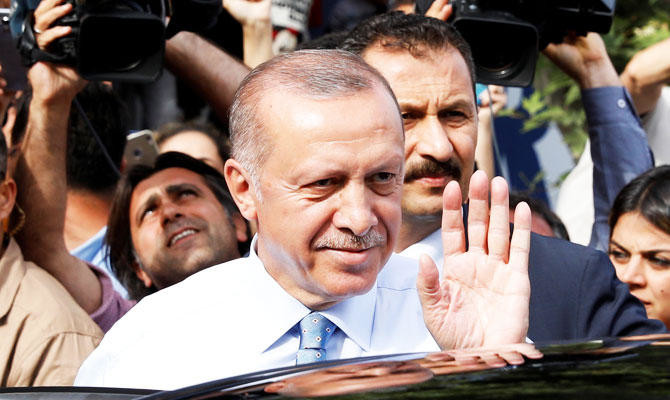
- Erdogan has just under 53 percent in the presidential poll while Ince, of the secular Republican People’s Party (CHP), was on 31 percent, state-run Anadolu news agency said, based on a 96 percent vote count
- The pro-Kurdish Peoples’ Democratic Party (HDP) was polling 11 percent, well over the 10 percent minimum threshold needed to win 46 seats, which would make it the second largest opposition party in the new chamber
Kurds deny torturing detainees in north Syria camps
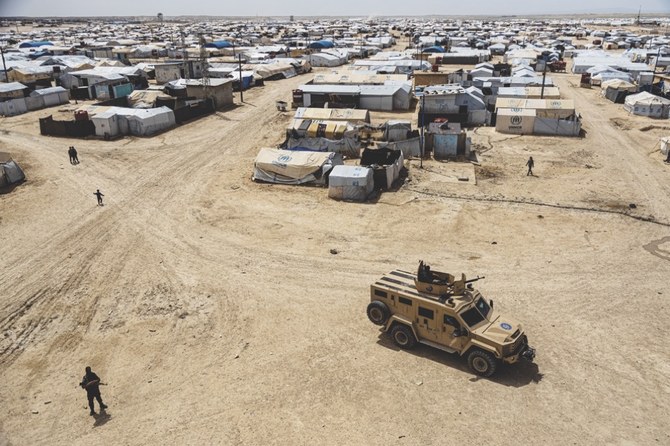
- Rights group alleges cruelty against Daesh militant prisoners and their families
JEDDAH: Kurdish authorities in northeast Syria on Thursday denied claims by Amnesty International that they tortured Daesh militants and their dependents detained in internment camps.
More than 56,000 prisoners with links to the Islamist militant group are still being held five years after Daesh were driven out of their last territory in Syria. They include militants locked up in prisons, and Daesh fighters’ wives and children in Al-Hol and Roj camps.
Amnesty secretary general Agnes Callamard said Kurdish authorities had “committed the war crimes of torture and cruel treatment, and probably committed the war crime of murder.”
The semi-autonomous Kurdish administration in northeast Syria said it “respects its obligations to prevent the violation of its laws, which prohibit such illegal acts, and adheres to international law.”
Any such crimes that may have been perpetrated were “individual acts,” it said, and asked Amnesty to provide it with any evidence of wrongdoing by its security forces and affiliates.
“We are open to cooperating with Amnesty International regarding its proposed recommendations, which require concerted regional and international efforts,” it said.
Kurdish authorities said they had repeatedly asked the international community for help in managing the camps, which required “huge financial resources.”
Al-Hol is the largest internment camp in northeast Syria, with more than 43,000 detainees from 47 countries, most of them women and children related to Daesh fighters.
Hamas is sending a delegation to Egypt for further ceasefire talks in the latest sign of progress

- US and Egyptian mediators have put to Hamas a proposal -– apparently with Israel’s acceptance — that sets out a three-stage process that would bring an immediate six-week ceasefire and partial release of Israeli hostages
BEIRUT: Hamas said Thursday that it was sending a delegation to Egypt for further ceasefire talks, in a new sign of progress in attempts by international mediators to hammer out an agreement between Israel and the militant group to end the war in Gaza.
After months of stop-and-start negotiations, the ceasefire efforts appear to have reached a critical stage, with Egyptian and American mediators reporting signs of compromise in recent days. But chances for the deal remain entangled with the key question of whether Israel will accept an end to the war without reaching its stated goal of destroying Hamas.
The stakes in the ceasefire negotiations were made clear in a new UN report that said if the Israel-Hamas war stops today, it will still take until 2040 to rebuild all the homes that have been destroyed by nearly seven months of Israeli bombardment and ground offensives in Gaza. It warned that the impact of the damage to the economy will set back development for generations and will only get worse with every month fighting continues.
The proposal that US and Egyptian mediators have put to Hamas -– apparently with Israel’s acceptance — sets out a three-stage process that would bring an immediate six-week ceasefire and partial release of Israeli hostages, but also negotiations over a “permanent calm” that includes some sort of Israeli withdrawal from Gaza, according to an Egyptian official. Hamas is seeking guarantees for a full Israeli withdrawal and complete end to the war.
Hamas officials have sent mixed signals about the proposal in recent days. But on Thursday, its supreme leader, Ismail Haniyeh, said in a statement that he had spoken to Egypt’s intelligence chief and “stressed the positive spirit of the movement in studying the ceasefire proposal.”
The statement said that Hamas negotiators would travel to Cairo “to complete the ongoing discussions with the aim of working forward for an agreement.” Haniyeh said he had also spoken to the prime minister of Qatar, another key mediator in the process.
The brokers are hopeful that the deal will bring an end to a conflict that has killed more than 34,000 Palestinians, according to local health officials, caused widespread destruction and plunged the territory into a humanitarian crisis. They also hope a deal will avert an Israeli attack on Rafah, where more than half of Gaza’s 2.3 million people have sought shelter after fleeing battle zones elsewhere in the territory.
If Israel does agree to end the war in return for a full hostage release, it would be a major turnaround. Since Hamas’ Oct. 7 attack stunned Israel, its leaders have vowed not to stop their bombardment and ground offensives until the militant group is destroyed. They also say Israel must keep a military presence in Gaza and security control after the war to ensure Hamas doesn’t rebuild.
Publicly at least, Israeli Prime Minister Benjamin Netanyahu continues to insist that is the only acceptable endgame.
He has vowed that even if a ceasefire is reached, Israel will eventually attack Rafah, which he says is Hamas’ last stronghold in Gaza. He repeated his determination to do so in talks Wednesday with US Secretary of State Antony Blinken, who was in Israel on a regional tour to push the deal through.
The agreement’s immediate fate hinges on whether Hamas will accept uncertainty over the final phases to bring the initial six-week pause in fighting — and at least postpone what it is feared would be a devastating assault on Rafah.
Egypt has been privately assuring Hamas that the deal will mean a total end to the war. But the Egyptian official said Hamas says the text’s language is too vague and wants it to specify a complete Israeli pullout from all of Gaza. The official spoke on condition of anonymity to talk about the internal deliberations.
On Wednesday evening, however, the news looked less positive as Osama Hamdan, a top Hamas official, expressed skepticism, saying the group’s initial position was “negative.” Speaking to Hezbollah’s Al-Manar TV, he said that talks were still ongoing but would stop if Israel invades Rafah.
Blinken hiked up pressure on Hamas to accept, saying Israel had made “very important” compromises.
“There’s no time for further haggling. The deal is there,” Blinken said Wednesday before leaving for the US
An Israeli airstrike, meanwhile, killed at least five people, including a child, in Deir Al-Balah in central Gaza. The bodies were seen and counted by Associated Press journalists at a hospital.
The war broke out on Oct. 7. when Hamas militants broke into southern Israel and killed over 1,200 people, mostly Israelis, taking around 250 others hostage, some released during a ceasefire on November.
The Israel-Hamas war was sparked by the Oct. 7 raid into southern Israel in which militants killed around 1,200 people, mostly civilians, and abducted around 250 hostages. Hamas is believed to still hold around 100 hostages and the remains of more than 30 others.
Since then, Israel’s campaign in Gaza has wreaked vast destruction and brought a humanitarian disaster, with several hundred thousand Palestinians in northern Gaza facing imminent famine, according to the UN More than 80 percent of the population has been driven from their homes.
The “productive basis of the economy has been destroyed” and poverty is rising sharply among Palestinians, according to the report released Thursday by the United Nations Development Program and the Economic and Social Commission for Western Asia.
It said that in 2024, the entire Palestinian economy — including both Gaza and the West Bank -– has so far contracted 25.8 percent. If the war continues, the loss will reach a “staggering” 29 percent by July, it said. The West Bank economy has been hit by Israel’s decision to cancel the work permits for tens of thousands of laborers who depended on jobs inside Israel.
“These new figures warn that the suffering in Gaza will not end when the war does,” UNDP administrator Achim Steiner said. He warned of a “serious development crisis that jeopardizes the future of generations to come.”
Syria says Israeli strike outside Damascus injures eight troops
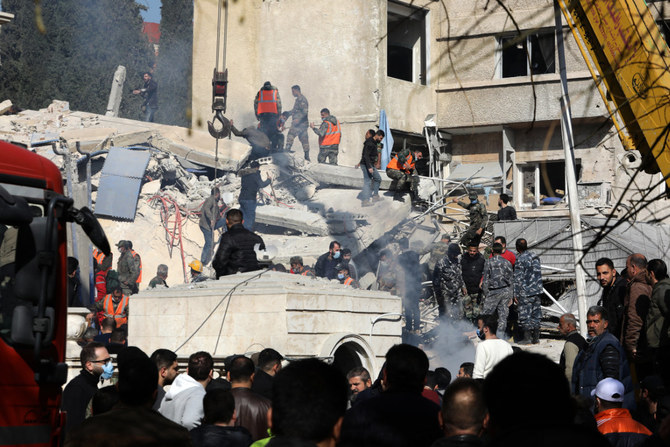
- A security source said the strike hit a building operated by government forces
- Defense ministry acknowledged only that the strike caused some material damage
An Israeli airstrike on the outskirts of Damascus injured eight Syrian military personnel late on Thursday, the Syrian defense ministry said, the latest such attack amid the war in Gaza.
The Israeli strike, launched from the occupied Golan Heights toward “one of the sites in the vicinity of Damascus,” caused some material damage, the Syrian defense ministry said in a statement.
The strike hit a building operated by Syrian security forces, a security source in the alliance backing Syria’s government earlier told Reuters.
The Israeli military said it does not comment on reports in the foreign media.
Israel has for years been striking Iran-linked targets in Syria and has stepped up its campaign in the war-torn country since Oct. 7, when Iran-backed Palestinian militants Hamas crossed into Israeli territory in an attack that left 1,200 people dead and led to more than 250 taken hostage.
Israel responded with a land, air and sea assault on the Gaza Strip, escalated strikes on Syria and exchanged fire with Lebanese armed group Hezbollah across Lebanon’s southern border.
The security source said the location struck in Syria on Thursday sat just south of the Sayyeda Zeinab shrine, where Hezbollah and Iranian forces are entrenched.
But the source said the site struck was not operated by Iranian units or Hezbollah.
Turkiye halts all trade with Israel, cites worsening Palestinian situation

- Turkiye’s trade ministry: ‘Export and import transactions related to Israel have been stopped, covering all products’
- Israel’s FM Israel Katz said that Turkish President Tayyip Erdogan was breaking agreements by blocking ports to Israeli imports and exports
ANKARA: Turkiye stopped all exports and imports to and from Israel as of Thursday, the Turkish trade ministry said, citing the “worsening humanitarian tragedy” in the Palestinian territories.
“Export and import transactions related to Israel have been stopped, covering all products,” Turkiye’s trade ministry said in a statement.
“Turkiye will strictly and decisively implement these new measures until the Israeli Government allows an uninterrupted and sufficient flow of humanitarian aid to Gaza.”
The two countries had a trade volume of $6.8 billion in 2023.
Turkiye last month imposed trade restrictions on Israel over what it said was Israel’s refusal to allow Ankara to take part in aid air-drop operations for Gaza and its offensive on the enclave.
Earlier on Thursday, Israel’s foreign minister said that Turkish President Tayyip Erdogan was breaking agreements by blocking ports to Israeli imports and exports.
“This is how a dictator behaves, disregarding the interests of the Turkish people and businessmen, and ignoring international trade agreements,” Israel’s Foreign Minister Israel Katz posted on X.
Katz said he instructed the foreign ministry to work to create alternatives for trade with Turkiye, focusing on local production and imports from other countries.
Palestinian groups say top Gaza surgeon died in Israeli custody

- Dr. Adnan Ahmed Atiya Al-Barsh died at the Israeli-run Ofer prison in the West Bank last month: advocacy groups
- Latest deaths brought to 18 the number of deaths in Israeli custody since the war began on October 7, groups said
RAMALLAH, Palestinian Territories: Palestinian advocacy groups said Thursday that the head of orthopedics at Gaza’s largest hospital Al-Shifa has died in Israeli custody, alleging he had been tortured during his detention.
Dr. Adnan Ahmed Atiya Al-Barsh died at the Israeli-run Ofer prison in the occupied West Bank last month, the Palestinian Prisoners Affairs Committee and the Palestinian Prisoners Club said in a joint statement.
Contacted by AFP about the reported death in custody, the Israeli army said: “We are currently not aware of such (an) incident.”
Barsh, 50, had been arrested with a group of other doctors last December at Al-Awda Hospital near the Jabalia refugee camp in northern Gaza.
He died on April 19, the prisoners groups said, citing Palestinian authorities.
“His body is still being held,” they added.
The groups said they had also learnt that another prisoner from Gaza, Ismail Abdel Bari Rajab Khadir, 33, had died in Israeli custody.
Khadir’s body was returned to Gaza on Thursday, as part of a routine repatriation of detainees by the army through the Kerem Shalom border crossing, the groups said, citing authorities on the Palestinian side of the crossing.
The groups said evidence suggested the two men had died “as a result of torture.”
They alleged that Barsh’s death was “part of a systematic targeting of doctors and the health system in Gaza.”
The health ministry in Hamas-ruled Gaza said the surgeon’s death amounted to “murder,” adding that it brought to 492 the number of health workers killed in Gaza since the war erupted nearly seven months ago.
The prisoners groups said the latest deaths brought to 18 the number of deaths in Israeli custody since the war began on October 7.
There have been repeated Israeli military operations around Gaza’s hospitals that have caused heavy damage.
Medical facilities are protected under international humanitarian law but the Israeli military has accused Hamas of using Gaza’s hospitals as cover for military operations, something the militant group denies.
The Al-Shifa hospital, where Barsh worked, has been reduced to rubble by repeated Israeli military operations, leaving what the World Health Organization described last month as an “empty shell.”
The war started with an unprecedented Hamas attack on southern Israel that resulted in the deaths of 1,170 people, mostly civilians, according to an AFP tally of Israeli official figures.
Israel estimates that 129 captives seized by militants during their attack remain in Gaza. The military says 34 of them are dead.
Israel’s retaliatory offensive against Hamas, has killed at least 34,596 people in Gaza, most of them women and children, according to the health ministry.


